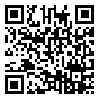Volume 8, Issue 1 (1-2023)
CJHR 2023, 8(1): 1-10 |
Back to browse issues page
1- School of Humanities, Tarbiat Modares University, Tehran, Iran
2- School of Humanities, Tarbiat Modares University, Tehran, Iran , hojjat.farahani2@gmail.com
3- Behavioral Sciences Research Center, Baqiyatallah University of Medical Sciences, Tehran, Iran.
2- School of Humanities, Tarbiat Modares University, Tehran, Iran , hojjat.farahani2@gmail.com
3- Behavioral Sciences Research Center, Baqiyatallah University of Medical Sciences, Tehran, Iran.
Abstract: (1018 Views)
Background: A high incidence of obsessive behaviors has been reported during the COVID-19 pandemic.
Objective: This study was carried out to estimate the effectiveness of cognitive-behavioral therapy based on mindfulness of psychological distress and tolerance of ambiguity in patients with COVID-19 obsession .
Materials & Methods: The present pretest-posttest study with a control group design was conducted on patients with COVID-19 obsession in 2021. The required information was collected using the COVID-19 obsession scale, a short form of psychological distress, and a tolerance of ambiguity questionnaire. The experimental group obtained ten 90-minute classes of cognitive-behavioral therapy based on mindfulness. The adjusted post-test scores were compared using an analysis of covariance.
Results: The mean age of participants in the experimental and control group was 31.84 (standard deviation (SD)=4.68) and 34.09 (SD=7.05) years, respectively. Cognitive-behavioral therapy based on mindfulness significantly reduced anxiety (F=41.99, P=0.001, η2=0.63), depression (F=27.19, P=0.001, η2=0.53), stress (F=26.92, P=0.001, η2=0.52), and increases tolerance of ambiguity (F=31.63, P=0.001, η2=0.57), in patients with COVID-19 obsession disorder.
Conclusion: The findings indicated that cognitive-behavioral therapy based on mindfulness appreciably improves the mental health of sufferers with COVID-19 obsession. Considering the long-term effects of COVID-19, psychology and counseling facilities should take measures to become aware of and treat vulnerable groups.
Objective: This study was carried out to estimate the effectiveness of cognitive-behavioral therapy based on mindfulness of psychological distress and tolerance of ambiguity in patients with COVID-19 obsession .
Materials & Methods: The present pretest-posttest study with a control group design was conducted on patients with COVID-19 obsession in 2021. The required information was collected using the COVID-19 obsession scale, a short form of psychological distress, and a tolerance of ambiguity questionnaire. The experimental group obtained ten 90-minute classes of cognitive-behavioral therapy based on mindfulness. The adjusted post-test scores were compared using an analysis of covariance.
Results: The mean age of participants in the experimental and control group was 31.84 (standard deviation (SD)=4.68) and 34.09 (SD=7.05) years, respectively. Cognitive-behavioral therapy based on mindfulness significantly reduced anxiety (F=41.99, P=0.001, η2=0.63), depression (F=27.19, P=0.001, η2=0.53), stress (F=26.92, P=0.001, η2=0.52), and increases tolerance of ambiguity (F=31.63, P=0.001, η2=0.57), in patients with COVID-19 obsession disorder.
Conclusion: The findings indicated that cognitive-behavioral therapy based on mindfulness appreciably improves the mental health of sufferers with COVID-19 obsession. Considering the long-term effects of COVID-19, psychology and counseling facilities should take measures to become aware of and treat vulnerable groups.
Article Type: Original Contributions |
Subject:
Public Health
Received: 2022/09/14 | Accepted: 2022/11/22 | Published: 2023/01/1
Received: 2022/09/14 | Accepted: 2022/11/22 | Published: 2023/01/1
| Rights and permissions | |
 | This work is licensed under a Creative Commons Attribution-NonCommercial 4.0 International License. |





